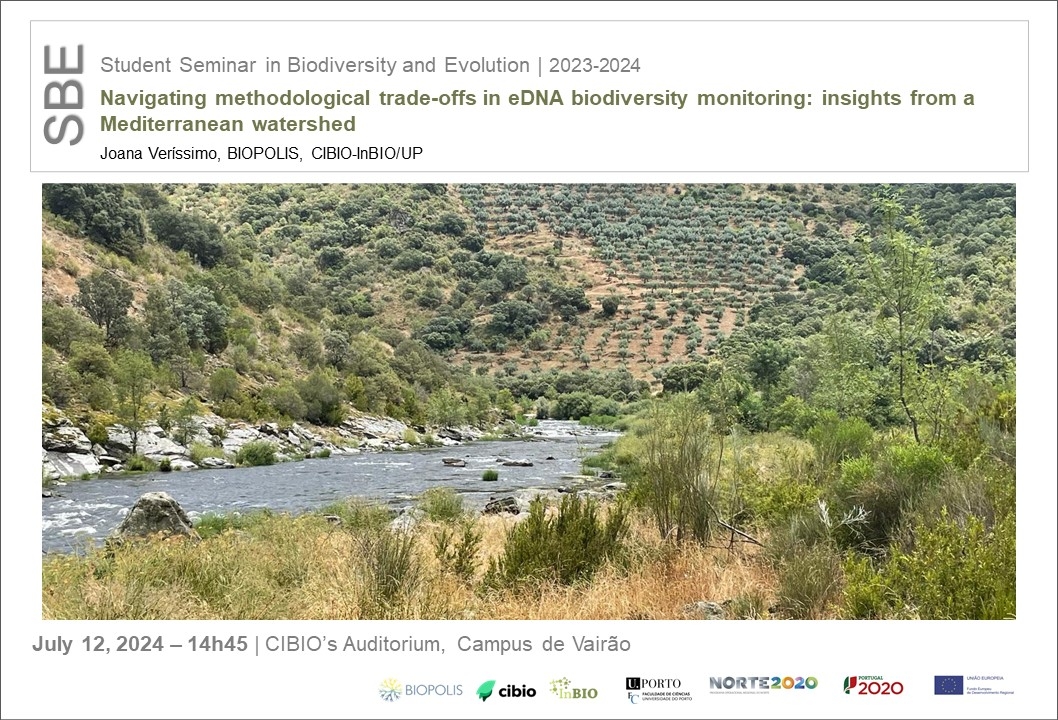Navigating methodological trade-offs in eDNA biodiversity monitoring: insights from a Mediterranean watershed
Event
STUDENT SEMINAR IN BIODIVERSITY AND EVOLUTION
July 12th, 2024
Joana Veríssimo, BIOPOLIS, CIBIO-InBIO/UP | 14h45 | CIBIO, Campus de Vairão

STUDENT SEMINAR IN BIODIVERSITY AND EVOLUTION
Environmental DNA (eDNA) technologies promise significant advances in biodiversity monitoring, yet their application requires extensive optimization and standardisation. Recent research demonstrated that increased sampling and analytical efforts are needed to improve biodiversity estimates, though fully optimising study designs is often hindered by resource constraints. Consequently, researchers must carefully navigate methodological trade-offs to design effective monitoring studies. We conducted a water eDNA survey of vertebrates in a Mediterranean watershed to identify key methodological factors influencing species richness and composition estimates. We examined the impacts of using high- versus low-capacity filtration capsules, varying levels of biological and technical replication, and the pooling of PCR replicates before indexing. The primary sources of variation identified were capsule filtration capacity and site replication across the watershed. While biological replication within sites and PCR replication also improved biodiversity estimates, their effects were comparatively smaller. Pooling PCR replicates before indexing performed much poorly than analysing them independently. Methodological impacts were stronger on terrestrial than on aquatic species. Based on these results, we recommend that priority should be given to high-capacity filtration and sampling across multiple sites. Site-level replication deserves lower priority, especially when filtering large water volumes. PCR replication is crucial for detecting rare species but should be balanced with increased site sampling and eventually site-level replication. Avoiding the pooling of PCR replicates is important to enhance sensitivity for rare species. Overall, we stress the importance of balancing methodological choices with resource constraints and monitoring goals, and we emphasize the need for research assessing methodological trade-offs in different study systems.
Joana Veríssimo is a BIODIV PhD student in the APPLECOL research group at BIOPOLIS/CIBIO-InBIO. Her primary research interest lies in advancing environmental DNA (eDNA) techniques to assess species distributions and dynamics. Previously, during her MSc, she investigated the genetic structure of the Iberian Pond Turtle. Afterwards, Joana moved towards a research assistant position within the EnvMetaGen project, where she provided a significant contribution in the laboratory procedures to deal with eDNA samples. Currently, she is undergoing her PhD where she is focused on enhancing aquatic eDNA technologies for biomonitoring, including the detection of invasive species and monitoring vertebrate communities.
[Host: Manuel Lopes-Lima, Freshwater, Conservation, Diversity and Evolution - FRESHCODE; Applied Ecology - APPLECOL]
Joana Veríssimo is a BIODIV PhD student in the APPLECOL research group at BIOPOLIS/CIBIO-InBIO. Her primary research interest lies in advancing environmental DNA (eDNA) techniques to assess species distributions and dynamics. Previously, during her MSc, she investigated the genetic structure of the Iberian Pond Turtle. Afterwards, Joana moved towards a research assistant position within the EnvMetaGen project, where she provided a significant contribution in the laboratory procedures to deal with eDNA samples. Currently, she is undergoing her PhD where she is focused on enhancing aquatic eDNA technologies for biomonitoring, including the detection of invasive species and monitoring vertebrate communities.
[Host: Manuel Lopes-Lima, Freshwater, Conservation, Diversity and Evolution - FRESHCODE; Applied Ecology - APPLECOL]
